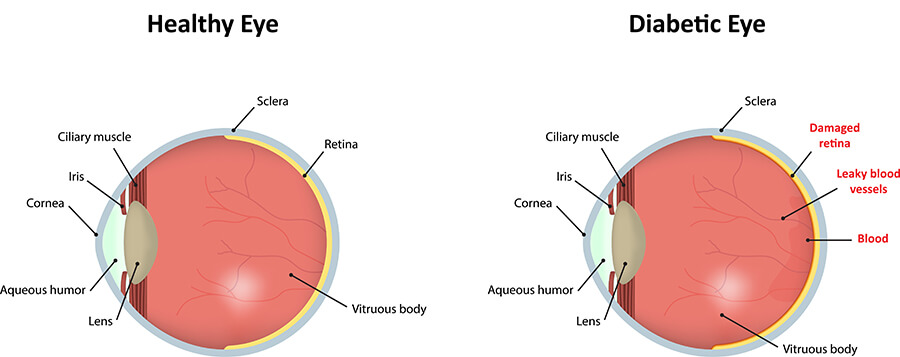Diabetic Retinopathy, Uncategorized
Is your diabetes putting your eyesight at risk?
If you live in Oceanside or anywhere in North San Diego County, staying informed about diabetic retinopathy could help you preserve your clear vision for years to come. At Pendleton Eye Center, we believe that healthy vision is your right. We understand how diabetes and even seasonal changes can affect your eyes in ways you might not expect. Let’s explore how this common eye condition develops, who’s at risk, and proactive steps you can take to stay ahead of it.
What Is Diabetic Retinopathy? Understanding the Impact of High Blood Sugar on Your Eyes
Diabetic retinopathy is a serious eye condition where consistently high blood sugar levels, common in individuals with diabetes, cause damage to the delicate blood vessels in the retina. The retina is the light-sensitive tissue at the back of the eye, essential for clear vision. If left untreated, this damage can lead to permanent vision loss.
The American Academy of Ophthalmology (AAO) reports that nearly 8 million Americans are currently living with diabetic retinopathy, and this number is projected to increase significantly as diabetes prevalence rises. Over time, advanced diabetic retinopathy can manifest as:
- Leaking blood vessels: Compromised vessels can leak fluid and blood into the retina.
- Retinal swelling (macular edema): Fluid accumulation in the macula, the central part of the retina responsible for sharp, detailed vision.
- Scar tissue formation: Abnormal growth on the retinal surface that can distort vision.
- Neovascularization: The growth of new, fragile blood vessels that are prone to bleeding.
- Retinal detachment: In severe cases, scar tissue can pull the retina away from its supporting tissues.

“One of the most important conditions we see is diabetic eye disease. It’s crucial for patients with diabetes to be screened regularly and treated appropriately — whether that’s with medicine injections, laser treatments, or careful monitoring. Diabetic retinopathy is a significant public health concern, and early detection truly makes a difference in preserving vision.”
— Dr. Rudometkin, Retina Specialist, Pendleton Eye Center
Why Summer Heat in Oceanside Can Make It Worse
July brings glorious sunshine and beach days to Oceanside, but it also presents unique challenges for individuals managing diabetes. Here’s why the summer heat can increase risks for your eyes:
- Dehydration from heat can lead to elevated blood sugar: When you’re dehydrated, blood sugar becomes more concentrated.
- Heat stress can interfere with diabetes management: Extreme temperatures can make it harder to manage insulin or oral medications effectively.
- Fluctuating glucose levels increase the risk of blood vessel damage in the eyes: Greater variations in blood sugar put more stress on your delicate retinal blood vessels.
During these hot summer months, it’s especially important to stay well-hydrated, diligently monitor your glucose levels, and schedule routine comprehensive eye exams to safeguard against diabetic eye problems.
Early Warning Signs of Diabetic Retinopathy You Shouldn’t Ignore
One of the challenges with diabetic retinopathy is that it often develops silently. But there are early symptoms you can watch for:
- Mild blurriness
- Floaters or spots in your vision
- Difficulty seeing at night
- Vision that comes and goes
- Dark or empty areas in your visual field
If you notice any of these signs, don’t wait. Early intervention can preserve your vision.
How Is Diabetic Retinopathy Treated?
At Pendleton Eye Center, our Retina Specialist Dr. Nathan Rudometkin, take a personalized approach to managing diabetic retinopathy. We start by performing regular dilated eye exams to closely monitor any changes in your retina. Depending on how advanced your condition is, your doctor will recommend the best treatment options to help prevent, manage, or in some cases even reverse vision damage caused by diabetes.
Your customized treatment plan may include:
- Better Blood Sugar and Blood Pressure Control
Keeping your blood sugar, blood pressure, and cholesterol within healthy ranges is the foundation for slowing or halting the progression of diabetic retinopathy. - Medications or Intraocular Injections
Your retina specialist may use steroid injections or anti-VEGF treatments — such as Avastin®, EYLEA®, or VABYSMO® — to reduce swelling, limit abnormal blood vessel growth, and preserve your sight. - Peripheral Laser Photocoagulation (PRP)
This advanced laser procedure creates tiny burns on the retina to seal leaking blood vessels or shrink abnormal ones, helping prevent further vision loss.
Conclusion: Proactive Eye Care is Key for Diabetes Patients in Oceanside
Living with diabetes doesn’t mean you have to lose your vision — but it does mean you need to stay proactive about your eye health. Diabetic retinopathy can develop silently, so regular dilated eye exams and timely, effective treatment are paramount to protecting your sight.
At Pendleton Eye Center, our dedicated retina specialists are here for you every step of the way — from early detection and ongoing monitoring to advanced treatment options – all conveniently located right here in Oceanside and North County San Diego.
Let’s keep your vision clear and your future bright. Don’t delay your diabetic eye exam in Oceanside. Call us at (760) 758-2008 or click down below to schedule your comprehensive diabetic eye exam today!
Here’s what our patients are saying about us:
“I’ve been a patient of Dr. Ashely Butler for years, and her care is always thoughtful, thorough, and kind. The staff is friendly and helpful, always taking the time to address any questions or concerns. I’m truly grateful for the excellent care I receive every visit.”
“The whole experience at Pendleton is nothing short of exceptional! Aside from the hospitality, the actual care and knowledgeable attention to detail is what sets them apart from others. Rather than over prescribe and over sell, Dr. Butler and Amy go above and beyond to ensure that a patient understands the information regarding their eyes and proper aftercare with detailed follow up. In what is typically a very transactional field, they definitely care more about the relationship which goes a long way and I can’t recommend them enough.”






